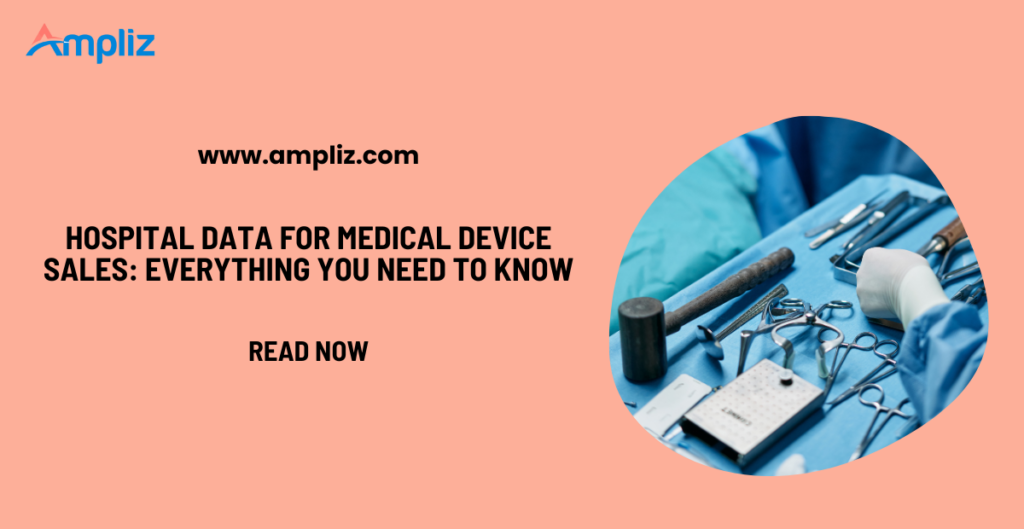In today’s competitive medtech landscape, success doesn’t just depend on innovative products—it also hinges on how effectively you reach the right buyers. For medical device companies, hospital data is the secret weapon that powers smarter targeting, optimized sales pipelines, and greater return on investment (ROI). This blog uncovers everything you need to know about leveraging hospital data for medical device sales, including what types of data are crucial, how to use them, where to get reliable sources, and how platforms like Ampliz can empower your strategy.
What is Hospital Data in the Context of Medical Device Sales?
Hospital data refers to a wide array of information collected from and about hospitals that can guide medical device sales strategies. In the medtech industry, this includes:
- Organizational Data: Hospital type (acute care, critical access, specialty), ownership (private, nonprofit, government), and size (bed count).
- Clinical Data: Medical specialties offered, procedure volumes, treatment capabilities.
- Financial Data: Net patient revenue, budget allocation, and spending trends.
- Operational Data: EMR systems used, device integration compatibility, procurement behavior.
- Personnel Data: Contact information of decision-makers like procurement heads, department chiefs, and physicians.
By understanding these data elements, medical device sales teams can align their outreach efforts to each hospital’s specific characteristics and needs.
Why Hospital Data is Crucial for Medical Device Sales Success
Medical device sales is no longer a game of quantity—it’s about quality outreach that leads to conversions. Here’s why hospital data for medical device companies is invaluable:
Align With Hospital Needs
Hospital data provides insight into what a facility actually needs. If you’re selling orthopedic implants, targeting hospitals with high volumes of joint replacement surgeries is far more effective than blind outreach.
Identify the Right Decision-Makers
Having access to hospital decision-maker lists helps sales reps reach procurement officers, surgeons, department heads, and C-suite executives who have the authority to purchase.
Streamline Sales Cycle
By focusing on hospitals with the right budget, specialty, and tech compatibility, you reduce the time wasted on unqualified leads and accelerate deal closures.
Increase Personalization
Hospital data empowers your sales team to tailor messages that speak directly to each facility’s pain points, improving open rates, responses, and relationship building.
Key Types of Hospital Data That Drive Medical Device Sales
Let’s dive deeper into the data types that play a pivotal role in hospital-based medical device selling:
1. Net Patient Revenue (NPR) & Budget Capacity
NPR reveals how much a hospital earns from patient services and reflects its financial strength. Medical device companies can:
- Prioritize hospitals with larger budgets for high-ticket equipment.
- Avoid wasting time on facilities with constrained resources.
- Match product pricing to hospital scale and revenue potential.
Example: If your product is a surgical robot, targeting a high-NPR facility ensures financial feasibility.
2. Hospital Specialties and Procedure Volumes
Understanding what procedures are performed—and how often—helps you pitch devices aligned with a hospital’s core services.
- Selling spinal implants? Focus on hospitals performing high volumes of spinal surgeries.
- Offering advanced diagnostic equipment? Target cardiology and oncology departments.
This specialty data ensures clinical relevance in your sales pitch.
3. EMR and System Compatibility Data
Hospitals use different Electronic Medical Record (EMR) systems like Epic, Cerner, or Meditech. Knowing their current system enables you to:
- Ensure your device integrates smoothly with their digital infrastructure.
- Avoid technical barriers during adoption.
- Collaborate with IT teams during onboarding.
4. Affiliation and Network Data (IDNs, GPOs, ACOs)
Understanding hospital affiliations is crucial for scaling outreach:
- IDNs (Integrated Delivery Networks): Selling to one hospital in the network may open doors to others.
- GPOs (Group Purchasing Organizations): Products must be listed on contracts used by multiple hospitals.
- ACOs (Accountable Care Organizations): Focus on value-based outcomes, affecting how devices are evaluated.
Example: If your product is listed with a major GPO, targeting its member hospitals can multiply your sales potential.
5. Physician and Department Head Data
Physicians are clinical influencers. Having access to data about top-performing surgeons or department leaders helps you:
- Build relationships with end users and influencers.
- Gain early buy-in from those who understand the device’s value.
- Navigate hospital bureaucracy by connecting with both clinical and administrative stakeholders.
How to Source High-Quality Hospital Data
Accessing accurate and actionable hospital data is critical. Here’s how you can source it:
Public Sources:
- CMS (Centers for Medicare & Medicaid Services) for procedure volumes and quality ratings.
- AHA (American Hospital Association) for hospital-level data.
However, these sources are often outdated or lack contact-level insights.
Commercial Data Providers:
Platforms like Ampliz specialize in providing healthcare data for medical device sales, including:
- Updated contact info for procurement and clinical leaders.
- Deep hospital intelligence (NPR, EMR, affiliation data).
- Filters to segment hospitals by specialty, budget, or geography.
By using a dedicated platform, you ensure data accuracy, compliance, and sales readiness.
How to Use Hospital Data in Your Sales Workflow
Once you have the right data, here’s how to apply it:
a. Territory Planning and Prioritization
Segment hospitals based on:
- Specialty match
- Net patient revenue
- Region or state
- GPO/IDN affiliation
This allows reps to plan smarter territories and optimize sales efforts.
b. Lead List Building & Personalization
Use filters to build a hospital decision-maker list that includes:
- Procurement heads
- Department directors (surgery, radiology, orthopedics)
- C-level hospital executives
Personalize outreach using contextual data like procedure volumes or recent tech adoption.
c. Campaign Strategy Optimization
Use hospital data to craft customized campaigns. Example strategies:
- Target hospitals using specific EMR systems for device integration messaging.
- Run email campaigns based on recent NPR growth trends.
This ensures relevance, boosting response and conversion rates.
d. Sales Enablement & Rep Training
Empower your reps with hospital data dashboards:
- Equip them with decision-maker profiles.
- Provide call scripts based on hospital specialties.
- Offer playbooks aligned with the hospital’s purchase journey.
Real-World Use Cases of Hospital Data in Medical Device Sales
Here are three examples of how medtech companies use hospital data to win deals:
✅ Case 1: Orthopedic Implant Company
They use Ampliz to identify hospitals performing 1000+ orthopedic procedures yearly, target orthopedic surgeons, and tailor messaging by surgical volume. Result: 3X lead-to-conversion ratio.
✅ Case 2: Diagnostic Imaging Device Provider
Targeted cancer treatment centers using EMR compatibility data and hospital budgets. Sales reps highlighted device integration and ROI, leading to faster product adoption.
✅ Case 3: Medtech Startup Entering Midwest Region
Used net patient revenue and IDN affiliation data to prioritize hospitals under large networks. Closed deals with 2 IDN-linked hospitals, leading to contracts with 7 more.
Challenges in Using Hospital Data Effectively
While powerful, hospital data comes with a few challenges:
- Data Freshness: Outdated contact data leads to bounced emails and dead ends.
- Volume Overload: Too much data without filtering can paralyze your sales process.
- Compliance: Must follow data privacy regulations (e.g., HIPAA in marketing).
The key is using a platform that provides clean, permission-based data—like Ampliz.
Why Choose Ampliz for Hospital Data
Ampliz is a leading healthcare data platform for medical device companies. Here’s how it stands out:
- Real-Time Hospital Data: Access data updated monthly, including financials, affiliations, and specialties.
- Contact-Level Intelligence: Reach over 2M+ verified healthcare decision-makers.
- Custom Filters: Build precise segments by EMR, GPO, budget, department, and more.
- CRM Integrations: Plug Ampliz data directly into Salesforce, HubSpot, or your outreach stack.
By using Ampliz, medical device sales teams reduce guesswork and focus on high-impact targets.
Conclusion
In today’s buyer-driven healthcare ecosystem, hospital data is no longer optional—it’s essential. For medical device companies seeking to scale smarter and faster, tapping into detailed hospital insights leads to better segmentation, more relevant outreach, and higher ROI.
From targeting high-NPR hospitals to navigating complex affiliations and reaching decision-makers directly, the right data transforms your strategy.
Ready to unlock the power of hospital data?
📩 Start your journey with Ampliz today and connect with high-potential hospitals and decision-makers effortlessly.



